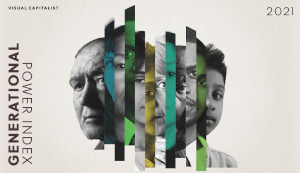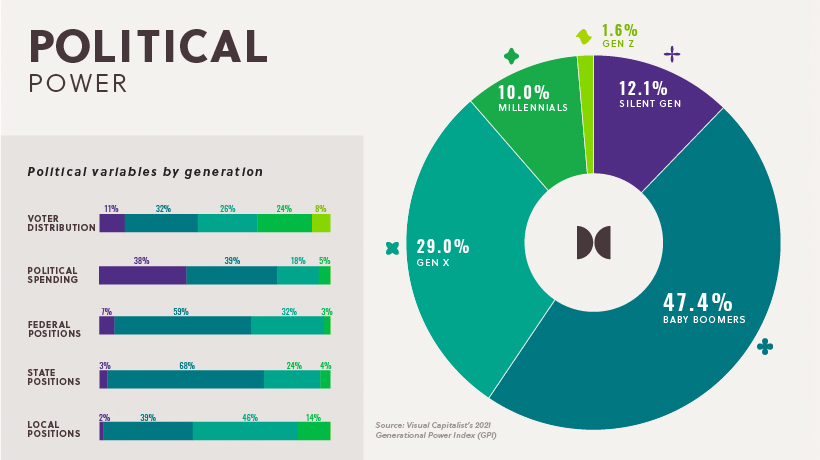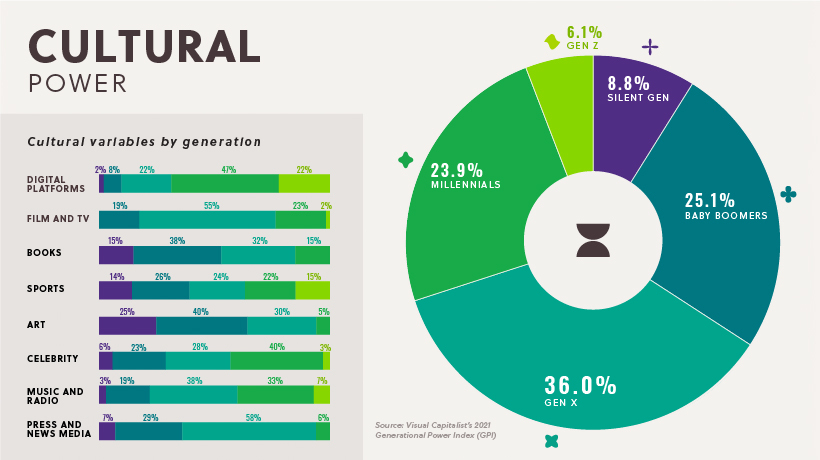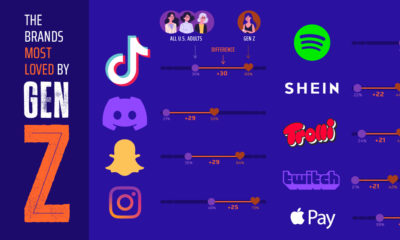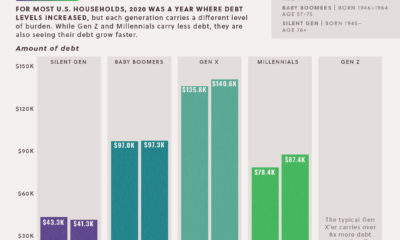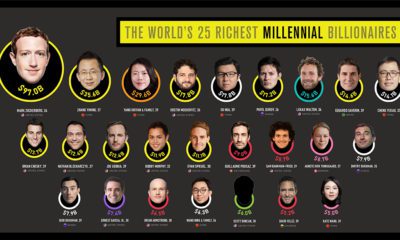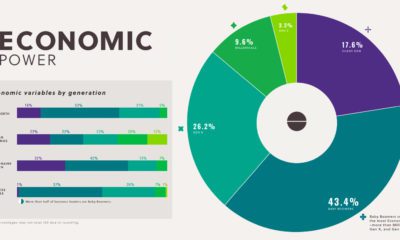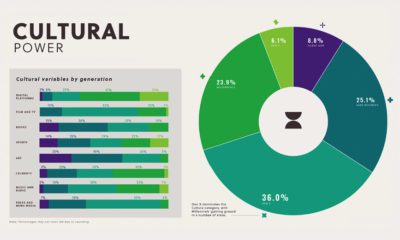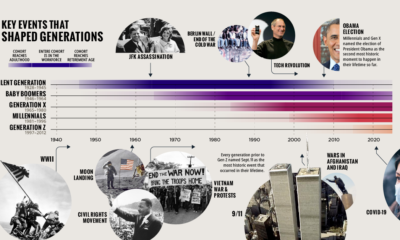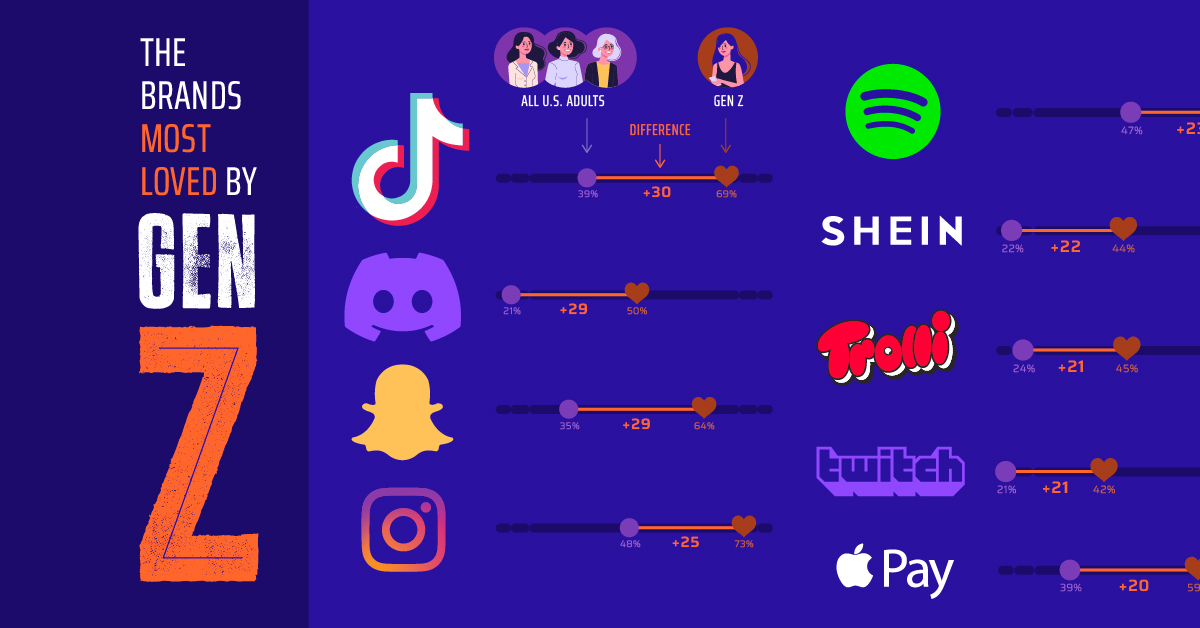As it stands, the Baby Boomers (born 1946-1964) are America’s most wealthy and influential generation. But even the youngest Boomers are close to retirement, with millions leaving the workforce every year. As Baby Boomers pass the torch, which generation will take their place as America’s most powerful?
In our inaugural Generational Power Index (GPI) for 2021, we’ve attempted to quantify how much power and influence each generation holds in American society, and what that means for the near future.
Download the Generational Power Report (.pdf)
Generation and Power, Defined
Before diving into the results of the first GPI, it’s important to explain how we’ve chosen to define both generations and power. Here’s the breakdown of how we categorized each generation, along with their age ranges and birth years. The above age brackets for each generation aren’t universally accepted. However, since our report largely focuses on U.S. data, we went with the most widely cited definitions, used by establishments such as Pew Research Center and the U.S. Federal Reserve. To measure power, we considered a variety of factors that fell under three main categories:
Economic Power Political Power Cultural Power
We’ll dive deeper into each category, and which generations dominated each one, below.
Overall Power, By Generation
Baby Boomers lead the pack when it comes to overall generational power, capturing 38.6%. While Boomers hold the largest share of power, it’s interesting to note that they only make up 21.8% of the total U.S. population. Gen X comes in second place, capturing 30.4% of power, while Gen Z ranks last, snagging a mere 3.7%. Gen Alpha has yet to score on the ranking, but keep in mind that the oldest members of this generation will only be eight years old this year—they haven’t even reached double digits yet.
Generational Power: Economics
Considering that Baby Boomers hold nearly 53% of all U.S. household wealth, it makes sense that they dominate when it comes to our measurement of Economic Power.
At 43.4%, the GPI shows that Boomers hold more economic influence than Gen X, Millennials, and Gen Z combined. They make up a majority of business leaders in the U.S., and hold 42% of billionaire wealth in America. Timing plays a role in the economic prosperity of Baby Boomers. They grew up in a post-WWII era, and spent their primary working years in a relatively stable, prosperous economy. In contrast, Millennials entered the workforce during the Great Recession and have seen only tenuous economic and wage growth, impacting their ability to accumulate wealth. Combine this with crippling amounts of student debt, and it’s no surprise that Millennials have nearly 50% less wealth than other generations (Boomers, Gen X) at a comparable age.
Generational Power: Political
In addition to holding the most Economic Power in the GPI, Baby Boomers also rank number one when it comes to Political Power. Boomers capture 47.4% of political influence. This generation accounts for 32% of all U.S. voters, and holds the majority of federal and state positions. For instance, 68% of U.S. senators are Baby Boomers. Political spending on election campaigns and lobbying predominantly comes from Boomers, too. When it comes to money spent on lobbying, we found that 60% of the top 20 spenders were from organizations led by Baby Boomers. In contrast, Millennials and Gen Zers barely make a splash in the political realm. That said, in the coming years, it’s estimated that the combined voting power of Millennials and Gen Z will see immense growth, rising from 32% of voters in 2020 up to 55% by 2036.
Cultural Power
There is one category where other generations gave Boomers a run for their money, which is in Cultural Power.
In this category, it’s actually Gen X that leads the pack, capturing 36.0% of Cultural Power. Gen X is especially dominant in press and news media—over half of America’s largest news corporations have a Gen Xer as their CEO, and a majority of the most influential news personalities are also members of Gen X. Despite a strong showing in our culture category, Gen X falls short in one key variable we looked at—the digital realm. On digital platforms, Millennials dominate when it comes to both users and content creators, and Gen Z has growing influence here as well.
The Future of Generational Power
Generational power is not stagnant, and it ebbs and flows over time. As this process naturally plays out, our new Generational Power Index and the coinciding annual report will aim to help quantify future shifts in power each year, while also highlighting the key stories that exemplify these new developments. For a full methodology of how we built the Generational Power Index, see pages 28-30 in the report PDF. This is the first year of the report, and any feedback is welcomed. on This ranking uses consumer preference data from Morning Consult to show which brands are favored considerably more by Gen Z when compared to the general public. A brand’s rank is determined by the difference in favorability between Gen Z’s survey responses and the average of all U.S. adult respondents. Note: Gen Z is the generation born between 1997-2012. Favorability in this ranking is measured using the share of a generation who said they have a “very” or “somewhat” favorable opinion of said brand.
Brands Preferred by Gen Z
Compared to Millennials, Gen X, and Boomers, who may not care as much for these 20 brands, Gen Z—currently between 9-25 years old—loves them. Let’s dive in: Note: Differences may not add up exactly due to rounding. Unsurprisingly, TikTok takes the top spot. The app that is frequently used to poke fun at older generations and that in many ways is a reflection of Gen Z culture, is 30 points more favorable with the young generation than others. Members of Gen Z are the first true “digital natives”—meaning they were raised in the age of digital technology. As a result, many of their favorite brands are either some kind of social media platform and/or digital service, like Apple Pay, Snapchat, or Spotify. In fact, eight of Gen Z’s top 10 favorites on the above list are digital brands. Another distinguishing feature of consumers in this generation is that they’re more likely to care about brand ethics and sustainable consumption than other generations. However, one brand among their top 20 that defies that sentiment is the Chinese clothing company, Shein. This fast fashion company’s model promotes a culture of mass clothing hauls and thus, clothing waste—making it far from environmentally conscious. Shein has also come under fire recently for violating labor laws in its Chinese production facilities. And yet 44% of Gen Zs have a good impression of the brand, and it particularly does well with Gen Z women. Interestingly, members of Gen Z in the U.S. are also the first cohort to have strong awareness of Chinese brands more generally.
Gen Z vs. Millennials
Two generations that are often lumped together, Gen Z and Millennials have some considerable differences when it comes to their favorite brands. Here’s a brief look at some of the brands that do better with Gen Z compared to Millennials specifically, using favorability difference:
TikTok: 14.2 Crocs: 13.4 Pixar: 8.1 Morphe: 6.1
Compared to their generational neighbors, one interesting standout is Crocs—the utilitarian, but highly-customizable foam clogs—which almost 60% of Gen Zs see as favorable compared to only 46% of Millennials.
Gen Z’s Favorite Brands Overall
While Gen Z differentiates itself from the older generations in many ways, a lot of the overall favorites still align with everyone else’s.
Gen Z Trends
Overall, the report found that it’s hard for brands to win with Gen Z. Across all brands that were scored, 33% of the general American public rated them as favorable, but for Gen Z respondents the number dropped to 27%. In general, Gen Z tends to value conscious consumption and subsequently, brands that can meet those expectations. Digital services and products also do well with this generation that has never known a world without internet. As more and more Gen Zers enter the labor market and grow their consumer power, they will be an important generation to watch.
